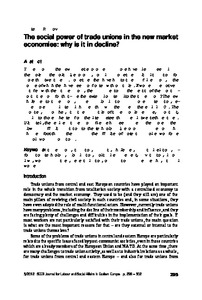The social power of trade unions in the new market economies: why is it in decline?

SEER. Journal for Labour and Social Affairs in Eastern Europe
2012
15
3
295-302
globalization ; labour relations ; information technology ; privatization ; trade union role ; trade union
Central Europe ; Eastern Europe
Trade unionism
http://www.nomos-zeitschriften.de/
English
Bibliogr.
"Trade unions in the new market economies in Europe have already been playing their roles in the political, economic, social and sometimes cultural transitions for more than twenty years. Sometimes they have had to take painful decisions, in the course of which they have been confronted with obstacles. If workers are not very satisfied with their trade unions, the main question is the identity of the most important reasons for that – are they external or internal to the trade unions? The new challenges to trade unions, caused by globalisation and European integration, require more radical internal changes than was the case in the early 1990s. The priorities, approaches, structures and styles of trade union leaders are, in contrast, similar to those inherited from the late nineteenth and early twentieth centuries. Ultimately, the decline in trade union influence has been caused rather more by their slow and difficult adaptation to the technological, economic and demographic changes afoot than by the crisis and the difficulties of protecting an older workforce and old working conditions. "
Digital;Paper
The ETUI is co-funded by the European Union. Views and opinions expressed are however those of the author(s) only and do not necessarily reflect those of the European Union or the ETUI.